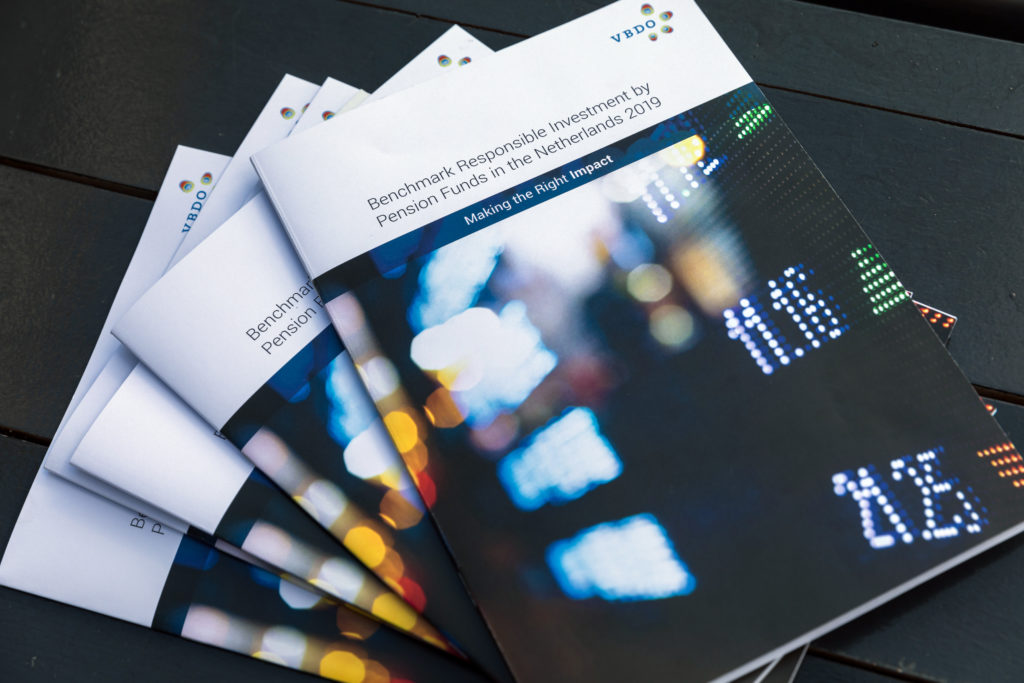Every year VBDO examines the performance of the responsible investment policy of Dutch pension funds. The benchmark assesses the 50 largest pension funds in the Netherlands, together accounting for 92% of the assets under management with a total value of more than € 1,230 billion. This year, the ABP pension fund achieved the highest score among all respondents.
“The purpose of the benchmark is to raise awareness about responsible investment and to encourage sustainable investment by pension funds,” said Angelique Laskewitz, director of the VBDO. She adds: “Benchmarks are an effective tool for encouraging sustainability improvements, because you use the competitive power of the market. They create a race to the top by offering comparative insight and identifying front-runners, encouraging sector-wide learning and sharing of good practice.”
ABP scored 4.6 out of a maximum of 5. ABP is closely followed by BPF Bouw (4.5) and PFZW (4.4). Each fund received a list with a total of 50 questions divided into 4 categories; governance, policy, implementation and accountability. As a whole, the sector scored slightly lower this year, which, according to Laskewitz, can be easily explained. “We have chosen to raise the bar this year by making some adjustments to a number of questions and assessments. We took these measures because to our content we see more and more development in the field of responsible investing. Our line of questioning has therefore become a bit more critical.”
Gerard Roest, FNV pensions director says he is happy with the results of the benchmark. “Global business must take even more account of human rights, workers’ rights and the environment. This benchmark of VBDO plays a crucial role in the assessment of pension funds in the ESG criteria and as FNV we would like to sponsor this initiative to take the sector to a higher level. We see that real steps are being taken”.
Yet he also sees room for improvement: “This year 100% of pension funds have included responsible investing in their investment beliefs. That is a nice first step, but we are not there yet. We see a lot of difference in depth within responsible investing. This means that responsible investment will become the norm, but the standards within that norm still vary widely. Pension funds should cooperate much more and support each other in this.
The results from the benchmark endorse Roest’s statement. For example, all pension funds now make use of the exclusion investment strategy, with which the investor consciously chooses not to invest in certain companies or countries due to undesirable activities or behavior. In contrast, for example, only 28% of the funds integrate a sustainability analysis into the investment analysis of the corporate bond portfolio.
Yet real progress is also visible in the report. For example, 58% of the funds this year made use of Impact Investing, an investment instrument that makes a positive, measurable contribution to people and the environment. An increase of 6% compared to 2018.
Laskewitz: “Impact Investing is a great tool. We see that more and more funds are using it, for example by investing in green bonds. As a fund, you have to take a critical look at those bonds. This year, we have put extra emphasis on this when compiling the benchmark, in particular on its selection. You have to look at the certification of the bond and whether a certificate is strong enough.
In addition to the 50 large pension funds examined, the Netherlands also has around 150 smaller funds. Laskewitz recognizes the importance of these funds. “They are important for innovation in the market, but at the same time they are in a difficult position. Due to laws and regulations, sustainability must be increasingly included in the policy and portfolio of a fund. For a smaller fund, it is not always easy to support all this. Directors and investors face a huge amount and due to all reporting guidelines they can easily lose the overview. Fortunately there is a lot of help available from different parties and you can use existing knowledge and expertise. In the end, we all benefit from a sector that continues to grow and becomes more sustainable across the board.”

